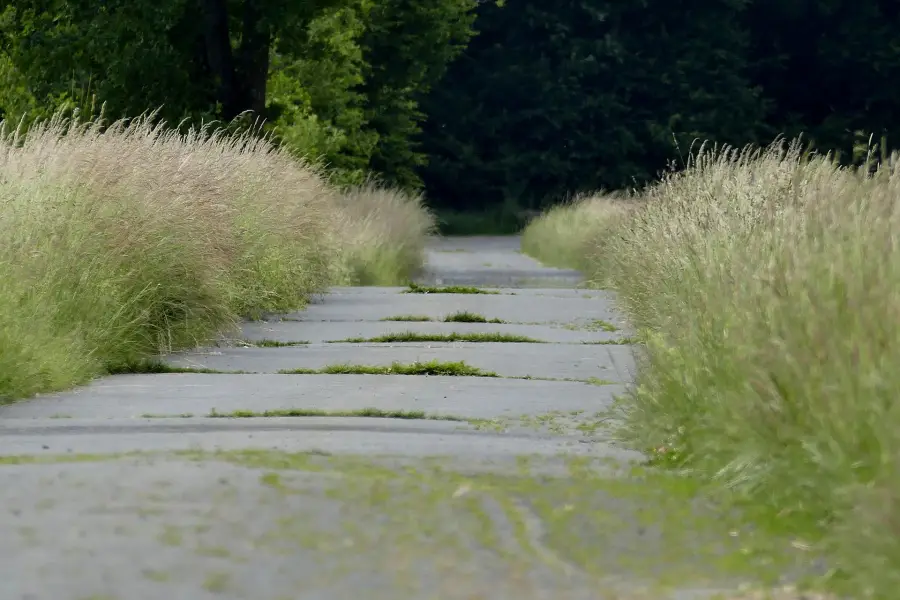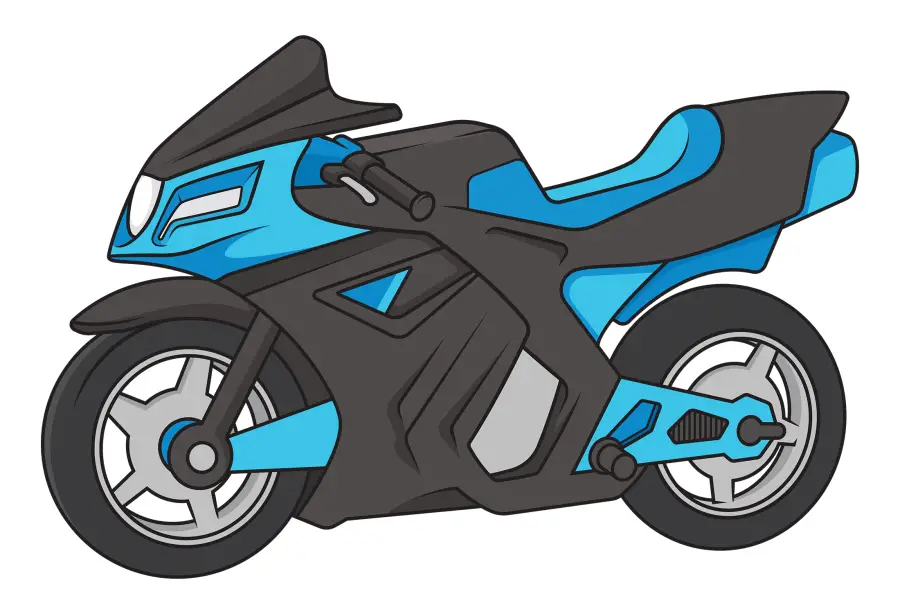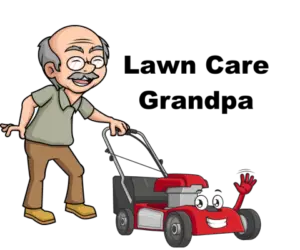Lawn care is a surprisingly demanding set of chores. Not only do you need to water and mow your grass consistently, but there is also the question of what to do with the clippings.
Blowing grass back into you lawn is always an option, but blowing grass into the street rarely ever is. Most cities and towns have ordinances about blowing grass into public streets due to drain clogs and safety. If blowing into your lawn you have many options.
The following article will tackle this question, as we take a look at what you should do with your grass clippings. Join in as we explore the legality and potential environmental impact of each of these options.

Contents
What Is Grass Blowing?
Blowing with either a leaf blower or one of the many types of lawn mowers is used primarily to move debris like leaves and especially grass clippings. So is this what is meant by grass blowing?
Grass blowing out of lawns, off sidewalks, or off driveways is normally one of the last things done when cutting the turf grass in a yard. These grass clippings are also blown out of flower beds and off porches all in the effort to tidy up and thwart grass growing in unwanted areas.
Let’s look at why you might want to blow grass clippings off of hard surfaces and even out of your lawn.
Blowing Grass Out Of Your Lawn
Lawns come in all shapes and sizes, with many types of grasses and conditions. Some of these situations aren’t ideal for grass growth due to shade, excess moisture, or not enough.
In these instances too much ‘pile’ or grass clipping buildup after a mowing can shade sections of grass and prevent their healthy growth. It is in these lawns that blowing grass away from the lawn, collecting grass, or using a leaf blower to spread clippings is advisable.
Grass blowing may seem like an unnecessary step to those not familiar with nursing an ailing lawn back to health, but it can be a vital tool when used by landscapers and lawn care crews.
Grass Blowing And Hard Surfaces
Hard surfaces look their best when clean and free of debris. Yet, there are other reasons for blowing grass off of hard surfaces, usually with a leaf blower.
Grass Grows In Unexpected Places
Even the tiniest of cracks are susceptible to grass growing in them and over time widening the line. A joke the lawn care crews like to tell goes like this…
We can try all Fall and Spring to get grass to grow in parts of a lawn, but spend as much time or more trying to get it to stop growing in the sidewalk.
Grass blowing rids these surfaces of grass seeds and clippings that can lead to unsightly and potentially damaging plants growing in the most unexpected places.
Grass Clippings Can Be A Slipping Hazzard

Some surfaces are worse than others for traction when they are wet. Then add wet grass clippings from your last mowing and you could find yourself in pain in an instant.
One of the leading accidents sending people to the hospital each year is falling. According to the CDC, the number one cause of death is unintended injury. In the top 5 of these is unintended falls.
Anyone that has tried to get grass clippings off of wet drives, walks, or patios knows how hard it is. That’s why blowing grass away from them or using a leaf blower to blow the clippings off again just after a mowing is important.
It may not look the best when grass grows in the cracks in your patio, but there is more to consider than just aesthetics. It can be a safety issue as well.
Should You Spread Cut Grass Back Into Your Yard?
The issue of dealing with grass clippings is crucial. Different periods, conditions, and personal preferences are the main guides when it comes to picking an option.
You should spread grass clippings back into your yard as opposed to in flower beds, onto walks, or onto public streets. This doesn’t mean you have to leave them there if it is not good for you particular lawn. They can be blown out, scattered, collected, or mulched.
Yes, you have options.
Mulching Grass Clippings Vs Blowing
The first, as the question above implies, is to spread your clippings back into your lawn. This process is known as mulching and it presents a few advantages and disadvantages.
Mulching grass clippings can be done in several ways depending on the kind of mower you use.
Side discharge lawnmowers eject clippings via a chute on the side of the mower deck as you cut. Normally, mulching clippings from a side-discharge mower will involve the use of a rake to ensure that they are spread evenly to prevent clumping.
Lawnmowers with a bagging attachment, on the other hand, collect clippings as they are ejected from the mower deck. Clippings from the bag can then be taken out and mulched onto desired spots on the lawn. You can also use a rake to ensure an even spread.
Mowers equipped with mulching kits and mulching blades (aka mulching mowers) are specifically meant for spreading grass clippings back into the lawn. Usually, a mulching mower will fire clippings directly into the ground below the deck as you cut.
Regardless of how you mulch, the effects are the same.
Does Mulching Grass Make It Thicker?
Mulching clippings is a great way to return nutrients to the soil and, eventually, the lawn. Grass clippings are rich in NPK (Nitrogen, Phosphorous, Potassium) nutrients that are essential for proper lawn development. Clippings will also help the soil retain moisture by minimizing water lost via evaporation.
Some types of grasses can also spread by their clippings. These cuttings can in the right environment take root and fill in small bare patches in your lawn.
Then there are times when grass is left unattended either intentionally or unintentionally. If the grass grows long enough, many will develop seeds that when cut and spread can also help to thicken the turf.
On the flip side, there are several reasons why you would want to avoid mulching your grass clippings back into the lawn.
Reasons To Avoid Blowing Grass Into Your Yard
If you’re dealing with a lawn disease, it is not advisable to mulch your clippings back into the lawn because this will only exacerbate the problem. Naturally, the clippings will also be infected, which will perpetuate the disease. In such a case, the clippings must be disposed of.
Another reason to avoid mulching is if moisture retention is not an issue. If you’re in the rainy season, there’s no need to prevent water from escaping. In fact, if you live in an area that receives a lot of rain, you want the excess water to escape to prevent flooding.
Some gardeners may opt to avoid mulching when mowing the grass for the first time after seeding or overseeding. Mulching young grass may stifle the still-emerging shoots and hinder the lawn’s development.
New grass is also highly susceptible to the effects of clumped grass clippings. One way clumping affects the development of shoots is by blocking sunlight.
Other people may opt for other forms of lawn fertilizer. This may be done by gardeners aiming to boost certain soil nutrients that may be lacking in grass clippings.
To see other great articles from LawncareGrandpa.com, check out some of these…
- Should I Bag Or Mulch After Overseeding?
- Neighbor’s Gutter Drains On My Property: Here’s What To Do
- Convert Lawn Mower To Mulcher: Here’s How To Do It
- Can You Mow Your Lawn On Sunday? Check Before Starting!
Composting Vs Blowing Grass
So, if you do not want to spread your clippings into the lawn, what are your options?
Firstly, you can compost the clippings. After collecting the clippings, you can form compost heaps in your yard. If you already have a composting solution, you can add the grass clippings to it.
Compost features high numbers of microorganisms, which will break down organic material even faster. Over time, the compost will break down and form a nitrogen-rich fertilizer that can be used on the lawn, flowerbeds, or vegetable gardens.
Yard Waste Management Companies
Another way of dealing with grass clippings is to dispose of them through a yard waste management company. These companies collect various forms of yard waste (branches, leaves, grass clippings) from subscribed members’ properties and dispose of them at legally sanctioned sites. We highly recommend this solution in cases of diseased lawn clippings.
In many cities your tax dollars also go to this same type of service provided by the municipal government. Check with your local town or city clerk’s office to find the schedule for ‘yard waste’ pickup.
There will normally be times each month and when you see some of your neighbors hauling their leaves, branches or other yard material to the curb, you will know you have the right time. To be certain, get a schedule from your local authorities.
Garden Mulch Vs Blowing Grass
Grass clippings can also be used as mulch for garden beds and flower pots. Their ability to boost soil moisture retention could prove crucial in these instances. Additionally, the grass will eventually break down and add nutrients to the soil below.
Livestock Vs Blowing Grass
If you have livestock on your property, you can dry out the clippings and use them as feed. Cows, horses, pigs, or even rabbits and guinea pigs will readily eat the grass. However, ensure that the clippings are not treated with chemicals and that they are dry. Wet clippings may make animals sick.
Other Options
Grass clippings can also be a key ingredient in liquid fertilizers.
You can also give the clippings away to friends or neighbors if they aren’t diseased of course. They can add the clippings to their own lawns and composts.
Is Blowing Grass Clippings In The Road Illegal?
Sounds like it is a good idea not to blow grass into the street, but is it actually illegal?
Blowing grass is illegal in most U.S. states…and neighborhoods. If there are not State guidelines, there may be city or town ordinances. In the absence of these, many HOA (Homeowners Associations) have guidelines for grass clippings and yard waste.
Not only does doing so decrease the overall aesthetics of the street, but it also risks blockage to vital street drainage systems. Even more worryingly, grass clippings can slicken a paved road surface, something that is especially risky for motorcyclists.
Usually, this sort of thing is covered by local town by-laws or homeowners’ association ordinances. Falling foul of this rule may be punishable with steep fines.
Take time to learn the rules in your town to be on the safe side. Many states do not expressly prohibit disposal of grass clippings, but may use the generic term “litter”.
Are Grass Clippings Really Slippery For Motorcycles?

If you are in an automobile and you see something in the road, be it ice or debris, you can simply maintain a constant speed and refrain from sudden wheel turns. Much of the time, at least two wheels will be in contact with the road at all times. Friction will be maintained and everything will turn out fine.
If grass clippings have been blown into the road and someone on a motorcycle cannot avoid them, they can come between the motorcycle tires and the road, breaking contact friction. This can cause the cyclist to loose directional or even total control.
On a motorcycle, it is a different story than in an automobile. There are of course only two wheels. These wheels have half the opportunity as a car to keep friction and contact with the road surface.
Simply maintaining speed and not veering may not be enough if there are enough clippings. It is even worse if if the road conditions are wet.
Does Grass Clippings Cause Motorcycle Accidents?
Now that we know that motorcycles can loose traction and become dangerous to handle when grass has been blown into the road, what could be the outcome. Do grass clippings in the road really cause motorcycle accidents?
Grass clippings definitely do cause motorcycle accidents both of the rider and of others on the road trying to avoid them as they slide. Fatal accidents have been reported that have led to tighter laws about homeowners blowing grass into public roads.
In 2019, one such incident occured taking the life of Cheryl Zeglan at the age of 59. While riding with her husband and friends the group suddenly came upon grass clippings in the road. Her husband began to loose control and slowed. His wife Cheryl crashed into him. She died two days later in the hospital.
Though accidents don’t happen every time someone blows grass into a street, all it takes in one time.
Is Blowing Grass Clippings Into Your Neighbor’s Yard Illegal?
This is a bit similar to the road disposal issue because many state-level statutes do not mention grass clippings, instead referring to “unlawful disposal and littering”.
In some areas, blowing grass clippings into a neighbor’s yard could be regarded as trespassing or harassment if it persists. It may be something that a particular local government enforces or not, but it is usually considered unlawful disposal.
In most areas, this would be considered to be pretty rude and detrimental to neighborly relations. We highly recommend that you avoid this, unless your neighbor grants permission of course.
Some people let their lawn naturally grow whatever type of grass it has access to. Others are very particular about what kinds of seed and clippings get into their lawn. Be sure to ask before you blow grass onto your neighbor’s lawn.
When in doubt, keep your clippings on your property until you are sure.
Final Touches On Blowing Grass On Roads Or Neighbors…
Though some areas may not have laws or regulations, it is always a good idea to deal with your lawn clippings yourself rather than push them onto someone else. It can be a nuisance to some and a hazard to others.
Even in areas where there are ordinances about blowing grass, not every place enforces it. This is true for grass clippings, water drainage, and even yard debris. Check with your local government and then with your neighbors to see how it actually works in your area.
As a general rule, it is always best to go by all state and local laws.
More great articles…
- A Gasoline Spill On Grass And Lawns? How To Fix It!
- Is A License Needed For A Lawnmower, Tractor, Or Farm Truck?
- Is There a Mower Gas Station Where I Get Gas for My Mower?
References
https://www.motherearthnews.com/organic-gardening/7-ways-to-use-grass-clippings-zbcz1605
